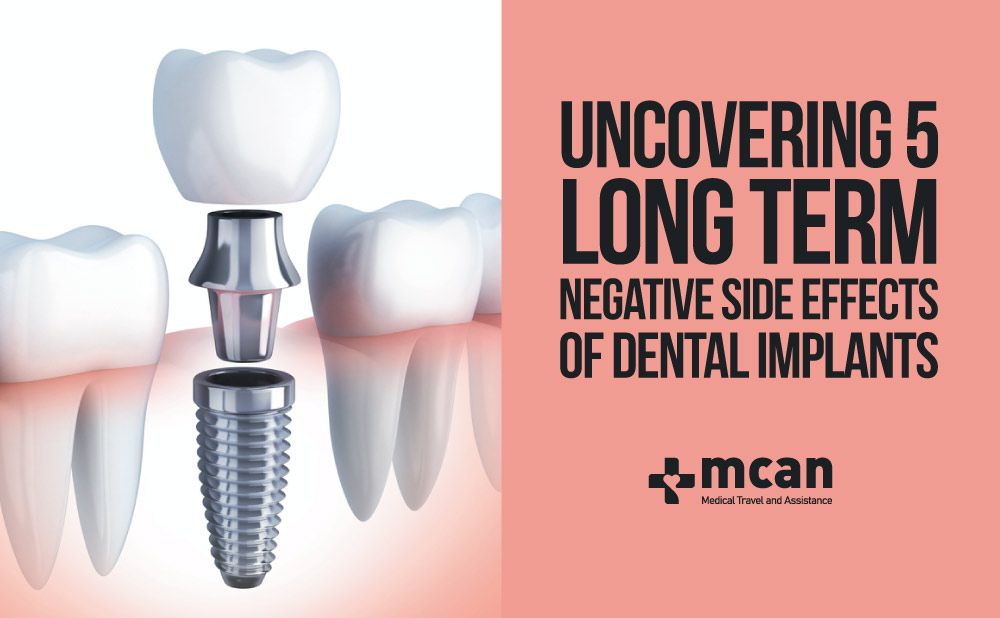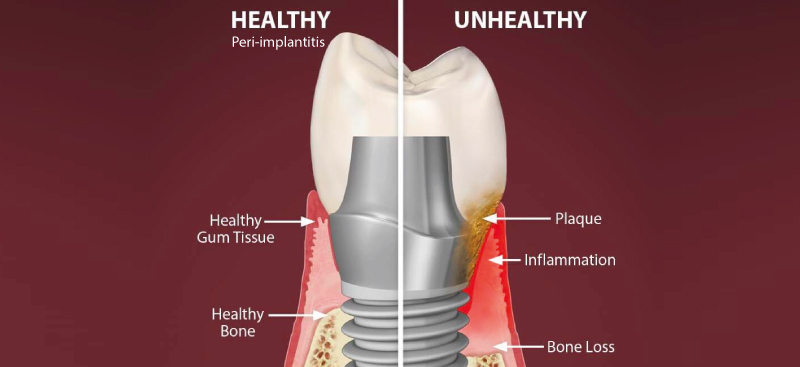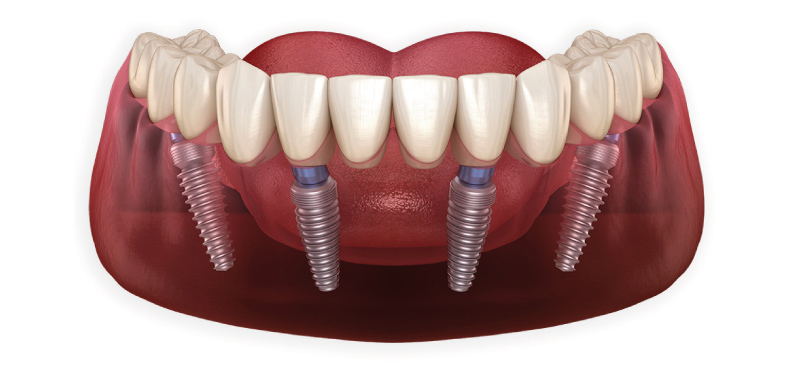
The long term negative side effects of dental implants should not be ignored. It is a fact that dental implants have a significant number of benefits for patients who are suffering from missing tooth or teeth. Offering a great alternative to dentures or bridges, dental implants fit in the mouth well, support the teeth and enhance the functionality of biting, chewing, and speaking. However, as with all medical or dental procedures, dental implants have some side effects and potential risks that patients should be aware of beforehand.
1. Infection
A common and severe side effect of dental implants is an infection in the treated area. The severity of this side effect of dental implants depends on where the infection emerges. Dental implant infection can occur in the gum or bone. If patients get an infection in the gum after the surgery, antibiotics help to remove it. However, suppose it is in the bone. In that case, it is more serious because it requires the removal of the infected bone tissue and implant.
2. Gum Recession
Gum recession can be expected after dental implant surgery. It is possible to realize gum tissue around implants. It is recommended to consult your dentist if the signs imply that a gum recession is happening.
3. Nerve or Tissue Damage
Another negative side effect of dental implants is nerve damage which gives the patients pain, numbness, or a tingling response in the mouth, face, or gums. Nerve or tissue damage is a long term side effect of dental implants. Therefore, patients must consult the doctor immediately when they have the symptoms.
4. Sinus Problems
Dental implants placed in the upper jaw bring out one of the terrible side effects of dental implants, sinus problems. Pain, tenderness, swelling around the cheeks, eyes, and neck; a blocked nose; toothache-headache; a high temperature are symptoms of the sinus causing inflammation. Please get in touch with your dentist if you are signing these adverse side effects of dental implants.
5. Implant Fracture
After dental implant surgery, patients must be more careful with their teeth to prevent fractures. Implant fracture happens when an extreme force is applied; clenching the teeth causes implant fracture. When your implant is fractured, you need to have a new implant.
Peri-implantits and Metal Allergies: Long Term Negative Side Effects of Titanium Dental Implants

Peri Implantitis Dental Implants Side Effect
Peri-implantitis, one of the long term side effects of titanium dental implants, is a risky side of having dental implants. It is a gum disease that causes loss of the bone supporting the implant. Peri-implantitis developing due to chronic inflammation at the implant site can take 4-5 years to progress and display symptoms of bleeding and swelling around the dental implants.
People who have metal allergies or sensitivities happen to experience long term negative side effects of titanium dental implants. The allergy and sensitivity can cause the body to react and reject dental implants. The symptoms of metal allergies are itching, swelling, redness, and pain in the affected area. Therefore, it is crucial to undergo metal sensitivity testing before the procedure. Your dentist can recommend alternative materials or treatments to minimize the long term negative side effects of titanium dental implants.
Temporary and Common Side Effects of Dental Implants You Need to Know
Some side effects are common consequences of dental implant treatment. They are a natural reaction to the changes that occur throughout the dental implant procedure. Although these temporary and common side effects of dental implants are often mild, it is good for patients to know about them.
Here are 4 temporary and common side effects of dental implants:
- Discomfort: Discomfort is a very common side effect of dental implants. In the days following the treatment, patients can have some discomfort. In this stage, feeling pain and tenderness is possible and expected. Your surgeon prescribes a painkiller to reduce your pain.
- Bleeding: After a dental implant procedure, it is likely to have bleeding at the implant site. As long as the bleeding is minimal, there is nothing to worry about. Bleeding can take 1-2 days.
- Swelling: Swelling is the most common side effect of dental implants. The gum line, cheeks, and side of the face can swell. It is recommended to use ice packs to reduce swelling!
- Bruising: Bruising is another common side effect of dental implants. It occurs on the face. Cold compression helps to reduce bruising.MCAN Health will follow up on your recovery process for a year after you get your dental treatment. In this process, it is essential to inform your patient experience experts at your service to answer all your questions and find a solution to any complications about any uncomfortable situation after the procedure.
All-on 4 Dental Implants Problems

All-on 4 Dental Implants Side Effects
While All-on 4 dental implants are popular and effective solutions, there can be potential problems associated with the procedure. These can include implant failure, infection, nerve damage, loosening, and sinus problems. Patients who receive all-on 4 implants in the upper jaw may experience sinus problems, including sinusitis and sinus lift complications. It is essential to discuss any potential risks and concerns with your dentist before undergoing the all-on 4 procedure, to ensure that you fully understand the benefits and drawbacks of this treatment option.
MCAN Health has been providing dental treatments, plastic surgery and hair transplant in Turkey since 2015. To get more information, please reach out to us.
 What Exactly is a Deep Plane Facelift Method? Do You Need It?
What Exactly is a Deep Plane Facelift Method? Do You Need It?